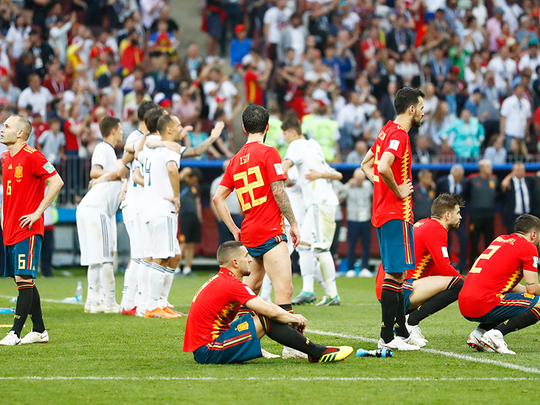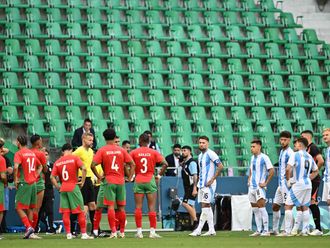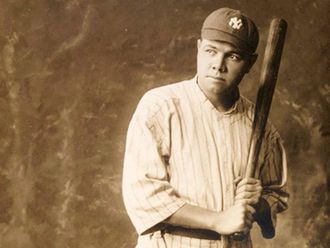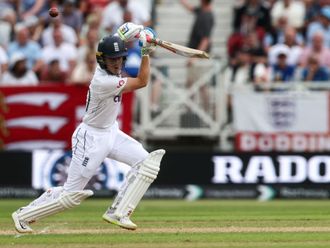
Moscow: Add this to your book of Russian proverbs: He who only passes is passed.
Mighty Spain dominated the field at Luzhniki Stadium, dulled the senses with mind-numbing ball movement around the perimeter of the penalty area on Sunday.
It was the classic “tiki-taka” style that led to a World Cup title in 2010, bookended by a pair of European Championships. The Spaniards would pass a team into confusion and then strike.
But this time, they just passed side-to-side, sometimes backward, almost never to attack.
Possession football appears to be a relic, ready for a display case in a football museum. Russia won a World Cup knockout game for the first time since the Soviet Union in 1966, defeating Spain 4-3 on penalty kicks after a 1-1 draw. Russia go to the quarter-finals against Croatia, while Spain go home.
“Everything is changing,” Spain coach Fernando Hierro said. “Trends change.”
Spain made 1,137 passes and completed 1,031, according to Fifa. Stat company Opta said that was the most since it started keeping track in 1966.
In contrast, Russia have completed two fewer passes — 1,029 — in four matches at the World Cup. Russia got the victory Sunday making 202 of 285 passes.
Russian coach Stanislav Cherchesov used a five-man defensive back line for the first time in this World Cup. Asked why, he thought back to the 2008 European Championship, where Russia lost to Spain 4-1 in their opener and 3-0 in the semi-finals.
“Let us say this openly, they are better than us in many ways,” he said. “So I don’t believe that we should risk going forward.”
Russia are ranked 70th in the world, the lowest in the field, and Spain are 10th. Home supporters with red-white-and-blue wigs and painted faces seemed prepared for an unhappy ending out of Tolstoy or Dostoyevsky, especially after Marco Asensio’s free kick ricocheted off a calf of defender Sergei Ignashevich in the 12th minute and past goalkeeper Igor Akinfeev for an own goal.
The hosts have staged a fine tournament, full of smiles, solyanka and samovars. They unexpectedly advanced. Losing to a world power in the round of 16 would be no shame.
But Gerard Pique’s handball put the Russian’s back in the match.
Pique, one of three starters left who played in the 2010 final victory over the Netherlands, was called for a blatant hand ball, leaping into a jumping jack as Artyom Dzyuba’s header bounced off his left arm. Pique wagged a finger at Dutch referee Bjorn Kuipers, but the decision stood.
In pretty much his only action before the shoot-out, goalkeeper David De Gea dived right as the Dzyuba’s third goal of the tournament went to his left.
Spanish King Felipe VI, on hand for the 2010 final in South Africa, was here for this one, too, exhorting his countrymen on. But while Spain finished with 75 per cent possession, they scored no more goals.
As rain came down, each team converted their first two kicks in the shoot-out, but Akinfeev dived right and with a two-handed punch stopped Jorge “Koke” Resurreccion. Alexander Golovin put Russia ahead, Sergio Ramos levelled and Denis Cheryshev gave Russia a 4-3 lead.
Akinfeev dived right on Iago Aspas’ kick and with his trailing left leg booted the ball to safety. Spain have gone three straight major tournaments without a title.
“In 2008, ’10, ’12, well, we had the players we had, and we played at a level, with a style had nobody had done before,” said Hierro, who took over as coach when Julen Lopetegui was fired two days before Spain’s opener. “Now we’re in 2018, and many things have changed. Now we see that people are playing with a line of five that we thought had been forgotten.”
Andres Iniesta and Xavi Hernandez were the twin hearts of Spain’s rise, offensive metronomes who elevated tiki-taka to supremacy at Barcelona and Spain. Hernandez is 38 and left the national team after Spain’s first-round elimination in 2014. Iniesta, 34, began the match on the bench, provided a spark after he entered in the 67th minute and called this defeat his finale.
“What’s important is to find the route to success, which is not easy,” he said. “It is more complicated than what it seems. The national team will push ahead because it still has players of quality and that’s what they need to try.”
Pique is 31 and Ramos 32, the last mainstays of Spain’s era of greatness. To rise again, the Spanish will have to evolve.
“We have our identity. Spain’s identity is recognisable,” Hierro said. “We have our personality, and this is a good thing.”












